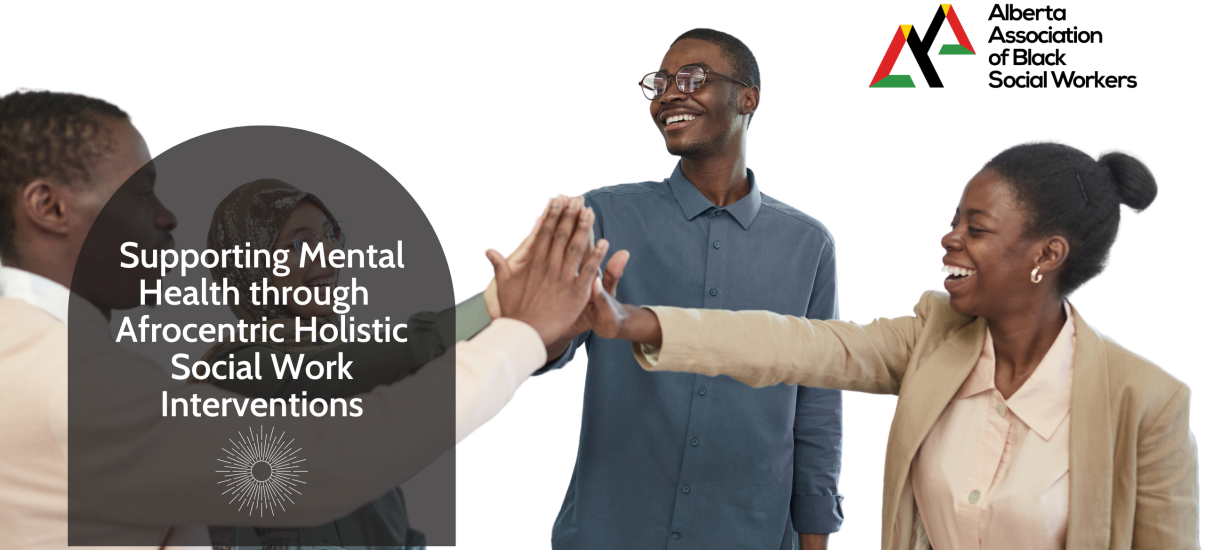AABSW Values and Principles Highlight
Often overlooked in many communities, holistic mental health is fundamental to overall well-being. As social workers, we strive to empower individuals and communities, addressing their challenges and promoting well-being. Our approach is Afrocentric, guided by the Nguzo Saba principles articulated by Dr. Maulana Karenga.
This perspective values cultural heritage and African-centered values, emphasizing mental, physical, emotional, and spiritual health interconnectedness. We consider multiple factors affecting mental health, developing customized strategies that address the unique needs of individuals within African and African diaspora communities.
We build collective capacity by fostering unity, self-determination, collective work, cooperative economics, purpose, creativity, and faith, equipping communities with the skills and resources needed to improve mental health.
Some critical components of our Afrocentric holistic approach include:
- Unity (Umoja): We nurture a sense of unity and togetherness by incorporating African-centered perspectives in our interventions, including culturally relevant individual and group therapy, psychoeducation, skills training, and community-based services. We should promote unity within families, communities, and organizations to foster a solid support system for individuals facing mental health challenges.
- Self-Determination (Kujichagulia): We should empower individuals to define, create, and speak for themselves. Our approach should encourage clients to participate actively in their well-being, drawing on their cultural heritage and strengths.
- Collective Work and Responsibility (Ujima): We work closely with other professionals and community organizations that share our commitment to Afrocentric well-being, creating a support network for our clients. We should emphasize the importance of collective work and responsibility in addressing mental health issues, recognizing that it takes a community to support individual well-being. This collaborative effort ensures that individuals receive well-rounded care and access to diverse resources.
- Cooperative Economics (Ujamaa): We advocate for policies and initiatives supporting mental health, social justice, and the well-being of African and African diaspora communities. We may use community resources and networks to provide accessible, culturally appropriate mental health support and services. By addressing systemic barriers and promoting equitable access to help, we contribute to the overall well-being of our communities.
- Purpose (Nia): We approach our work purposefully, focusing on building collective capacity and fostering the cultural, social, and spiritual growth of individuals and communities. We should promote a sense of purpose and meaning in mental health interventions, incorporating cultural and spiritual practices that align with individuals’ values and beliefs.
- Creativity (Kuumba): We integrate creative and culturally relevant therapies, such as storytelling, dance, and music therapy, to facilitate healing and well-being. We continually engage in professional development and research to stay informed and up-to-date on best practices in Afrocentric social work. This principle allows us to develop innovative and culturally grounded interventions.
- Faith (Imani): We emphasize the importance of faith in ourselves, our people, and our struggle for liberation, justice, and equality. We should recognize the role of religion and spirituality in mental health and encourage individuals to draw upon their spiritual beliefs and practices for strength and resilience. We strive to develop interventions honouring and valuing individual perspectives, cultural ideas, and spiritual practices.
By grounding our social work practice in the principles of the Nguzo Saba, we ensure that our interventions remain culturally relevant, holistic, and focused on building collective capacity within African and African diaspora communities. By prioritizing cultural identity, incorporating traditional healing practices, and promoting community involvement, these interventions can help individuals achieve greater overall well-being and resilience.
References
Karenga, D. M. (2022, July 20). African Liberation Day and the Nguzo Saba: Principles and practices for liberating struggle. Institute of the Black World 21st Century. Retrieved May 3, 2023, from https://ibw21.org/commentary/dr-maulana-karenga/african-liberation-day-and-the-nguzo-saba/
McDougal, S. (2009). [Review of Seeking the Sakhu: Foundational Writings for an African Psychology, by W. Nobles]. Journal of Black Studies, 39(3), 487–489. http://www.jstor.org/stable/40282575
Mkize, D.L. (2003). Towards an Afrocentric approach to psychiatry. South African Journal of Psychiatry, pp. 9, 3-6. https://doi.org/10.4102/sajpsychiatry.v9i1.128
Schiele, J. H. (1996). Afrocentricity: An emerging paradigm in social work practice. Social Work, 41(3), 284–294.
Schiele, J. H. (2000). Human Services and the Afrocentric Paradigm. Routledge. Retrieved from https://www.routledge.com/Human-Services-and-the-Afrocentric-Paradigm/Schiele-Schiele/p/book/9780789005663
Sue, D. W., & Sue, D. (2016). Counselling the culturally diverse: Theory and practice (7th ed.). Wiley. Retrieved from https://www.wiley.com/en-ie/Counseling+the+Culturally+Diverse%3A+Theory+and+Practice%2C+7th+Edition-p-9781119084303

